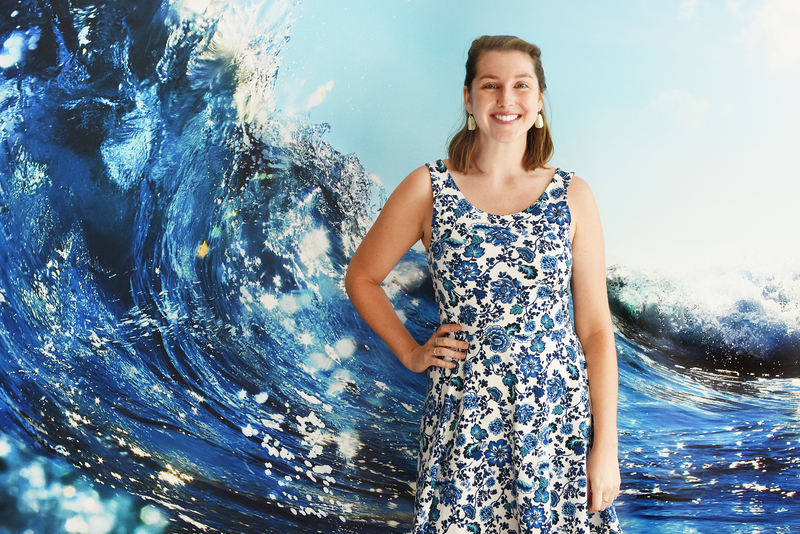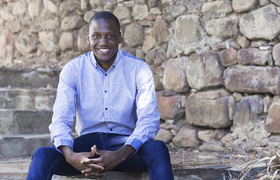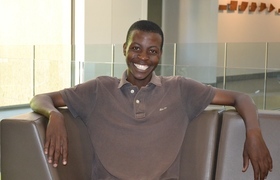Talking about current affairs
28 March 2018 | Story Penny Haw. Photo Robyn Walker. Read time 8 min.
Physical oceanographer Katherine Hutchinson navigated an unusual course to her PhD. Not only did her journey include ocean expeditions to Antarctica, Gough Island, Tristan da Cunha, the Prince Edward Islands and up and down the Agulhas Current, but also academic exchanges to France and the United States.
Moreover, with the end of her studies in sight, she experienced a journey of self-discovery when she recognised that her passion for science was matched with an ambition to communicate her knowledge and its relevance. Enter Dr Katherine Hutchinson, oceanographer and communicator.
With a father who is “an old surfer”, she has had a lifelong attachment to the ocean, but her interest in environmental science blossomed at Reddam House high school in Green Point where her French teacher had a penchant for the subject.
“With just five of us in the class, we were able to focus closely on it,” she recalls. “I produced French essays and orals on subjects like melting ice caps and rising sea levels.”
Making choices
Despite her parents vying for her to pursue either of their fields – her mother is a lawyer and her father is an engineer – Hutchinson was determined to study environmental science at UCT. When she enrolled for a BSc in 2008, however, she was initially disappointed by the course content.
“I liked the concepts around people and sustainability, but was more drawn to physics. In second year, I thought I might focus on that instead, which was why I chose oceanography.”
She was soon hooked.
“The first time I sat in an oceanography class, Professor [Isabelle] Ansorge (now head of Oceanography) showed a movie about students going to Antarctica. I turned to my friend Sandi and said, ‘I am going to go there.’
“I knew immediately that was what I wanted to do. I saw that I could combine my love for physics and the environment by focusing on physics of the ocean.”
At the end of her third year, with oceanography and environmental and geographical science majors, Hutchinson was among four undergraduate students to earn a place on the SA Agulhas I. She celebrated her 21st birthday between Antarctica and South Georgia Island.
“My coming-of-age took place on the ocean; I can’t think of any place more appropriate.”
First UCT student to earn a co-badged masterʼs degree
Having investigated changes in the Southern Ocean while circumnavigating Antarctica for her honours degree, Hutchinson successfully applied for the first co-badged masterʼs to be offered by UCT and lʼUniversite de Bretagne Occidentale (Brest University) in Brittany, France.
With co-supervisors in Cape Town and Brest, and focusing on alterations in heat and salt in the Antarctic Circumpolar Current south of Africa, this meant spending four months a year in France.
The opportunity, she says, not only gave her the chance to experience academia and life in a different country, but also gave her a chance to practise her French.
There were other opportunities too. In 2013, Brest University funded her attendance of the International Association for the Physical Sciences of the Oceans Conference in Sweden where she presented her masterʼs research.
“We need to break down our knowledge and start communicating it and its relevance to a broader public community.”
Test-run year
With her masterʼs complete, Hutchinson found herself at a junction. Her French supervisor offered her the opportunity to do her PhD in Paris. She was tempted. Who wouldn’t want to experience la vie Parisienne? But she was also homesick and unsure about the micro-scale project on offer.
She mentioned her uncertainties to Ansorge when they encountered one another at the conference in Sweden. The professor suggested that Hutchinson come back and work as her intern at UCT for a year, teach some classes, go on another expedition and find a PhD subject she was truly passionate about.
“Katherine is very driven,” says Ansorge, who has known her since she was an undergraduate. “She’s not only a good scientist; she’s proactive and dependable with a ‘yes, I can and I will’ attitude. She’ll succeed at whatever she sets her mind to.”
For Hutchinson, the professor’s endorsement was a gift.
“I felt as if I had been given permission to come home and have a test run at academia,” she says. “I taught a course on the Southern Ocean, which I loved, got involved in various other projects, and was able to lead students on an expedition to Marion Island on the SA Agulhas II.”
Hutchinson also reconnected with an American scientist she’d met during her masterʼs who was researching the Agulhas Current. This led to a PhD opportunity focusing on the Agulhas Current with affiliations to UCT, the University of Miami’s Rosenstiel School of Marine and Atmospheric Science (RSMAS), LʼInstitut de recherche pour le développement and the South African Environmental Observations Network.
Local and global impact
The Agulhas Current, which runs along South Africa’s east coast, is one of the world’s fastest and strongest currents. It not only influences local climate and rainfall, but, because it transports warm tropical Indian Ocean water southwards, also plays a critical role in global ocean circulation, thereby influencing climatic conditions across the world.
“This is the kind of science I am interested in,” says Hutchinson. “It’s locally and globally significant. It’s important science; exactly the kind I imagined focusing on for my PhD.”
She spent three months at RSMAS, which was “mind-blowing”. Not only did she have access to “advanced and on-point courses”, but the school is adjacent to the National Oceanic and Atmospheric Administration, which meant that she could easily attend seminars there too.
Redefining a role
It was during a final stint in Miami that Hutchinson began thinking about redefining her role as a scientist.
“I was at RSMAS just after Donald Trump had been elected,” she explains. “Scientists were shocked and grappled to understand how it had happened. I began thinking about the communication of science and where responsibility lies.
“Is the onus on policymakers and government to come and talk to scientists about important science? Or do we, as scientists, need to be stronger cheerleaders for what we know and discover? Is it our responsibility to translate our knowledge and make it relevant to everyone so that we can help drive change?”
Shortly afterwards, she met Dr Gavin Schmidt, the director of the NASA Goddard Institute for Space Studies in New York. He was interested in her ideas, but conceded that science communicators are not that prevalent at present. It didn’t discourage her.
The gist of the matter, she says, is that while she loves the academic aspect of science, it is not enough for her to feel fulfilled.
“I don’t feel like I am making a big enough difference. We need to break down our knowledge and start communicating it and its relevance to a broader public community.”
In her “I can and I will” way, Hutchinson has already begun her journey as an oceanographer and communicator. Her articles and videos are increasingly available in various publications and platforms. They are also archived on her website.
 This work is licensed under a Creative Commons Attribution-NoDerivatives 4.0 International License.
This work is licensed under a Creative Commons Attribution-NoDerivatives 4.0 International License.
Please view the republishing articles page for more information.










